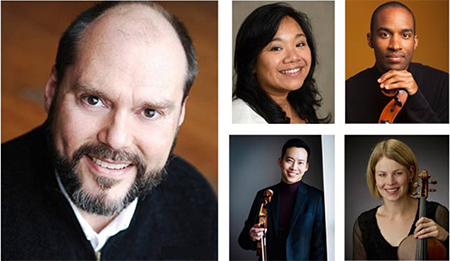by Daniel Hathaway
Tonight at 7:30 at West Shore Unitarian Universalist Church, the Rocky River Chamber Music Society presents tenor JR Fralick & Friends — Christine Fuoco, piano, Steve Sang Koh, violin, Lembi Veskimets, viola, and Khari Joyner, cello in works by Dmitri Shostakovich, Frank Bridge & Richard Strauss. The concert will also be live streamed here.
NEWS BRIEFS:
Cleveland Uncommon Sound Project (CUSP) has announced the lineup for its upcoming Re:Sound Festival, scheduled for May 16 and 17. Click here to view the announcement.
Cuyahoga Arts & Culture’s Board of Trustees will hold a regular meeting on Tuesday, February 25, in the 2nd Floor Learning Commons of the Louis Stokes wing of the Main Cleveland Public Library.
At the meeting, the agency will share grant-making and finance updates, hold a work session to discuss financial forecasting, and conduct other routine matters of business.
CAC’s Board meetings are open to the public. Please visit cacgrants.org for a full listing of upcoming Board meetings and to view the agenda and handout materials for this meeting.
TODAY’S ALMANAC:
by Jarrett Hoffman
February 24 brings anniversaries for two French composers, an Italian soprano, and one genre-mixing American musician.
Let’s start with Chicago-born composer, violinist, and violist Leroy Jenkins, who died on this date in 2007 in New York City, and who was known for working in the space between jazz and classical music. One example of his unique, hybrid style of writing is his Themes and Improvisations on the Blues, featured in The New York Times’ “5 Minutes” article on string quartets, which includes a recording of that piece by the Soldier Quartet.
As the Times’ Seth Colter Walls wrote:
Some of the writing has a puckish air reminiscent of Neo-Classical Stravinsky, refracted through an American prism. When members of the quartet respond to Jenkins’s invitation to improvise — he calculated that approximately 30 percent of this performance was spontaneously conceived — their bent notes and dramatic glissandos echo the songful cries of Jenkins’s own playing.
One of the leading French composers of the 17th century, Marc-Antoine Charpentier — who died on this date in 1704 in Paris — has been a popular figure on the programs of Quire Cleveland over the years. Among the recordings on their excellent YouTube Channel is a live performance of the Kyrie from one of Charpentier’s most famous works, the Midnight Mass for Christmas, a piece that’s especially appealing for its use of several French carols. Listen here.
Another French composer from several generations later died on February 24, 1929. That would be André Messager, who studied with Camille Saint-Saëns and Gabriel Fauré, and who is best known for his opérettes and opéra comiques such as Véronique, and for ballets such as Les Deux Pigeons.
Here’s a short clip of “The Two Pigeons” from a 2016 performance by the Royal Ballet and the Orchestra of the Royal Opera House, led by Barry Wordsworth. The music is great, but an even better reason to watch is the elegant and bouncy footwork from Fumi Kaneko and Vadim Muntagirov in Frederick Ashton’s 1961 choreography.
And Italian soprano-turned-opera-director Renata Scotto was born today. Considered one of the greatest vocalists of her generation, Scotto is also known as an exceptional actress. That combination of talents came up in her extensive interview with Stephen Rubin for The New York Times in 1978:
I prefer the great personality. Take a role like Butterfly. They say I’m the best Butterfly because I act, identify with the role. But this identification is very, very controlled by myself. I am an actress, but I am also a singer. Even when I am deeply involved in the character, I don’t forget that I am on stage. If I control myself, I never go overboard. If I don’t control myself, I go crazy. I remember the first time I sang Butterfly, I started to cry. I was finished.
Listen to Scotto in that very role here, singing “Un bel dì” to celebrate her 46th birthday.
Other anniversaries on this date include the birth of Czech conductor Jiří Bělohlávek in 1946, and the death of Russian-American composer and pianist Leo Ornstein in 2002 — at the age of either 108 or 109.




